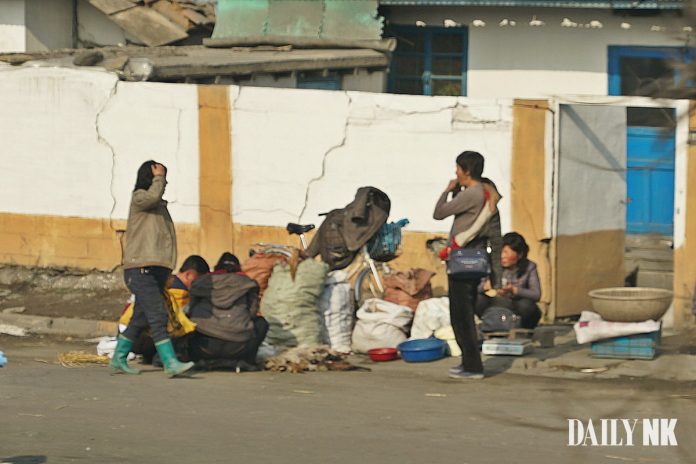North Korean authorities are selling grain such as rice and corn through state food shops to mark the 10th anniversary of North Korean leader Kim Jong Un’s reign and the completion of the country’s nuclear weapons program.
However, the authorities are offering so little grain that the sale is having a negligible impact on market grain sales.
According to multiple Daily NK sources in North Korea on Tuesday, North Korean authorities ordered people’s committees across the country to sell rice, corn and other grains at state-run food shops through the end of the year.
There are slight differences in the timing from region to region, but state-run food shops in most areas are currently selling grain, with sales scheduled to end prior to Dec. 31.
FOOD PROVIDED “OUT OF WARM LOVE” FOR THE PEOPLE
A high-ranking source said the food provision is aimed at marking Kim’s 10th year in power and the completion of North Korea’s nuclear weapons program.
Because of this, the authorities have issued “public lecture material on the Supreme Leader (Kim)” through neighborhood watch units and organizations such as the Socialist Women’s Union of Korea.
The material reportedly said the decade of Kim’s “revolutionary leadership” has been “full of accomplishments that will live long in the history of the Fatherland,” citing two in particular: how Kim “created for our descendants a nation without war by perfecting our nuclear power,” and how “the nation acquired the means not just to defend, but to attack as well.”
The materials also reportedly said that while Kim himself has decided to endure an “arduous march,” he has provided grain “out of a warm love for the people,” namely, a desire to let them eat rice.
However, the food provided through the state food shops is not free, but sold at prices 15 to 25% lower than market prices.
Daily NK has determined that the prices of rice and corn at state food shops differ from region to region.
Generally speaking, a kilogram of rice costs KPW 4,200 to 4,800 at state food shops nationwide, while corn costs KPW 2,200 to 2,500.
However, state-run food shops are reportedly limiting how much grain people can buy due to insufficient supplies.
Households can buy up to two kilograms of rice and five kilograms of corn.
Nevertheless, households with the cash are buying the maximum amount from the state food shops since the prices are lower than the markets.
North Korean authorities are providing low-cost food to the public while emphasizing Kim’s “love for the people,” but people are complaining nonetheless.
This is because in some regions like South Pyongan Province, the authorities have set separate dates when each workplace and organization can purchase grain.
For example, rather than let everyone purchase grain at the same time, they give teachers and doctors priority access to the grain, after which ordinary people — including laborers — can make purchases.
State-run food shops are saying that if the priority purchasers exhaust their grain stores, they will sell grain to ordinary workers in January, but the source said that nobody believes them.
GOVERNMENT RICE HAS “LOTS OF STONES” AND OTHER FOREIGN OBJECTS
Moreover, the rice and corn on sale at the state-run food shops is reportedly of much lower quality than the rice offered by markets, being damp with lots of stones and other foreign objects.
A Daily NK source in Pyongyang said that since the rice and corn sold at the food shops is poor in quality and low in quantity, market grain prices will not fall “just because the state is selling rice.”
There could be a short-term drop in market grain prices due to the government’s sales, but it will not be enough to stabilize grain prices.
In fact, according to Daily NK’s regular survey of market prices in North Korea, a kilogram of rice cost KPW 5,700 in Pyongyang as of Sunday, up KPW 100 from about two weeks earlier on Dec. 12.
However, a kilogram of corn cost KPW 3,000 in Pyongyang’s markets on Dec. 12, but it cost 12% less at KPW 2,630 on Sunday.
In the case of Hyesan, Yanggang Province, the price of both rice and corn was slightly up from two weeks earlier, so determining the impact of the food shops’ sales on market grain prices will likely become clear after the passage of time.
Please direct any comments or questions about this article to dailynkenglish@uni-media.net.



















